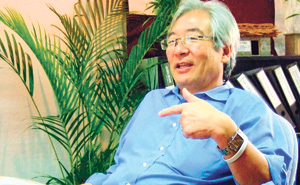Asian NGOs need to take the lead from international, non-Asian NGOs in working in Asia because these NGOs understand the dynamics, culture and local people much better than anyone else, an experienced Asian NGO leader says.
Hironobu Shinbuya, CEO, Save the Children (SC), Japan, in a recent interview with The Sunday Times also frowned on ‘foreign’ experts who try to impose solutions on local communities without proper consultations.
“Everywhere I go I can sense this happening (imposition by foreign experts) and within the alliance we have a very serious discussion about this. The UN system itself is an old system and needs to change,” he said, adding that in five to 10 years time there won’t be a need for (foreign) experts. “What is important (in our case) is that Save the Children adheres to the general conditions and behaves (with dignity) wherever it works.”
 |
| Hironobu Shinbuya |
Mr Shinbuya, a veteran UN worker who also counted well-known Sri Lankan journalist, the late Tarzie Vittachi as a colleague and friend during the latter’s time in UNICEF and child-related activity in the 1960s-1970s, was in Sri Lanka last month to review the progress of SCF Japan work here.
The SC, working exclusively on children’s issues, is a unique structure with an international headquarters in London and 28 members or branches across the world working as independent units, raising their own funds and deciding on the projects, individually. The alliance, now 90 years, is older than UNICEF.
“We are now consolidating our activities in developing countries, operating independently but sharing capacity and skills,” he said, adding that SC Japan came here with tsunami funds and is now involved in humanitarian work as a result of the war.It works closely with the Japanese government in projects overseas with Mr Shinbuya saying that donor countries are now increasingly self conscious about their national interest. “The Japanese government would like to know when they fund a project that somebody reliable like SC (Japan) is on the ground to ensure the project is implemented,” he said.
He said both JICA (Japanese International Cooperation Agency) and the Japanese government would like to diversify its aid to Sri Lanka. “It’s nice to build roads and infrastructure but what is needed is the social aspect (too). JICA is not used to working on soft areas and hence need to look for partners (NGOs). In this context they would prefer to work with Japanese NGOs.”
The SC Japan CEO says he met Senior Presidential Advisor Basil Rajapaksa in Colombo where many issues were discussed. The latter, he said, referred to the enormous challenges in the north and that it was not merely a matter of building bridges, roads or highways but also providing basic services.
Mr. Shinbuya agrees, saying there is an urgency to deliver services. “Just yakking (NGOs complaining) about it is not good enough. We need to deliver.”
SC Japan committed $300,000 last year while securing another $450,000 for work in Vavuniya. The organization has set aside $300,000 for child development work in Trincomalee. Like what alliance members do in other countries, SC Japan uses the resources and logistics support of SC UK which runs the Sri Lankan operation.
It is also working on a joint project with ADB for household economic support in the poorest districts.
He feels that ODA (Official Development Assistance) globally is unlikely to fall even though there is a financial and economic crisis in the world. “I feel Obama (US President) is going to live up to what he says (helping needy countries). I think ODA will actually grow this year.”
Responding to another key issue vis-à-vis NGOs and their focus in being visible through ‘branding’ (sticking labels at a project site or press releases, etc) their work (to ensure the people know who is doing what), the SC Japan CEO said that while other agencies want branding, the Japanese are a ‘quiet’ people and not savvy at any engagement (with the people). “The Japanese find it difficult to get engaged. You could put it down to shyness maybe. Nevertheless we make sure money is spent wisely. The Japanese virtue prevents us from talking about what we do. It’s a complex issue.” But he says that the policy of ‘not too much talk’ helps as many governments feel Japan is more trustworthy.
Mr Shinbuya, who has years of experience working in the international arena, is pushing for Asian NGOs which are more pragmatic than the western ones (‘no offence to western NGOs’) to play a bigger role in Asia. “The Asian dynamic is very different and Asian NGOs understand this better than anyone else when working in Asia. The mindset of non-Asia NGOs must change (so that they will be able to understand a country better when working in Asia). On my part I am urging that the SC Alliance move its headquarters to Singapore or Bangkok from London,” he added.
“I am not knocking down western ways … I am only saying that some of the institutional framework whether the UN, banks (World Bank/IMF), or international corporations needs a paradigm shift in the way they work.”
On a parting note, he says it is essential to work with governments. “Working with governments doesn’t mean taking everything what they say. You can also make constructive criticism. You have to be smart and sensible (in this criticism).” |

